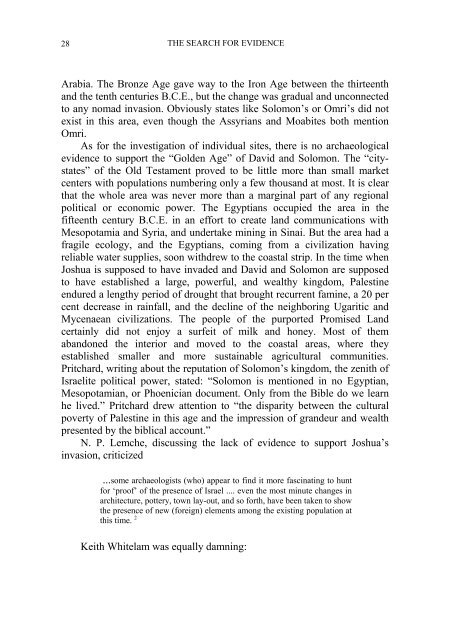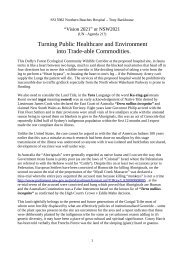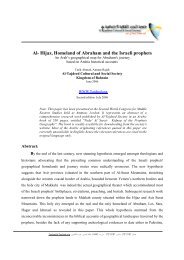Sheba
Sheba
Sheba
You also want an ePaper? Increase the reach of your titles
YUMPU automatically turns print PDFs into web optimized ePapers that Google loves.
28<br />
THE SEARCH FOR EVIDENCE<br />
Arabia. The Bronze Age gave way to the Iron Age between the thirteenth<br />
and the tenth centuries B.C.E., but the change was gradual and unconnected<br />
to any nomad invasion. Obviously states like Solomon’s or Omri’s did not<br />
exist in this area, even though the Assyrians and Moabites both mention<br />
Omri.<br />
As for the investigation of individual sites, there is no archaeological<br />
evidence to support the “Golden Age” of David and Solomon. The “citystates”<br />
of the Old Testament proved to be little more than small market<br />
centers with populations numbering only a few thousand at most. It is clear<br />
that the whole area was never more than a marginal part of any regional<br />
political or economic power. The Egyptians occupied the area in the<br />
fifteenth century B.C.E. in an effort to create land communications with<br />
Mesopotamia and Syria, and undertake mining in Sinai. But the area had a<br />
fragile ecology, and the Egyptians, coming from a civilization having<br />
reliable water supplies, soon withdrew to the coastal strip. In the time when<br />
Joshua is supposed to have invaded and David and Solomon are supposed<br />
to have established a large, powerful, and wealthy kingdom, Palestine<br />
endured a lengthy period of drought that brought recurrent famine, a 20 per<br />
cent decrease in rainfall, and the decline of the neighboring Ugaritic and<br />
Mycenaean civilizations. The people of the purported Promised Land<br />
certainly did not enjoy a surfeit of milk and honey. Most of them<br />
abandoned the interior and moved to the coastal areas, where they<br />
established smaller and more sustainable agricultural communities.<br />
Pritchard, writing about the reputation of Solomon’s kingdom, the zenith of<br />
Israelite political power, stated: “Solomon is mentioned in no Egyptian,<br />
Mesopotamian, or Phoenician document. Only from the Bible do we learn<br />
he lived.” Pritchard drew attention to “the disparity between the cultural<br />
poverty of Palestine in this age and the impression of grandeur and wealth<br />
presented by the biblical account.”<br />
N. P. Lemche, discussing the lack of evidence to support Joshua’s<br />
invasion, criticized<br />
...some archaeologists (who) appear to find it more fascinating to hunt<br />
for ‘proof’ of the presence of Israel .... even the most minute changes in<br />
architecture, pottery, town lay-out, and so forth, have been taken to show<br />
the presence of new (foreign) elements among the existing population at<br />
this time. 2<br />
Keith Whitelam was equally damning:




